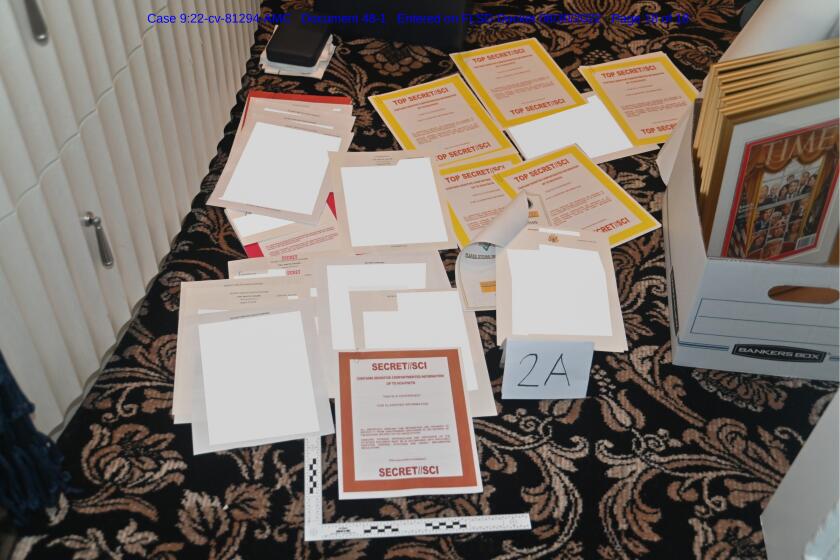Veteran New York judge named as arbiter in Trump Mar-a-Lago investigation

- Share via
WASHINGTON — A federal judge on Thursday appointed a veteran New York jurist to serve as an independent arbiter and review records seized during an FBI search of former President Trump’s Florida home last month.
In her order, U.S. District Judge Aileen Cannon refused a Justice Department request to lift her temporary prohibition on the department’s use of the roughly 100 classified records that were taken during the Aug. 8 search. She also granted the newly named special master, Raymond Dearie, access to the entire tranche of documents seized from the property even though the department had said the arbiter shouldn’t be permitted to inspect the batch of classified records.
The Justice Department is expected to contest the judge’s order to a federal appeals court. It had given Cannon until Thursday to put on hold her order barring the continued review of classified records, and said it would ask the Atlanta-based 11th U.S. Circuit Court of Appeals to intervene if she did not do so then.
A Justice Department spokesman did not immediately return a message Thursday evening.
The selection of Dearie, a former federal prosecutor who for years served as the chief judge of the federal court based in Brooklyn, came after both the Justice Department and Trump’s lawyers made clear that they would be satisfied with his appointment as a so-called special master.
In that role, Dearie will be responsible for reviewing the documents taken during the search of Mar-a-Lago and segregating out any that may be covered by claims of privilege. It is not clear how long the work will take but the special master process has already delayed the investigation, with Cannon directing the Justice Department to temporarily pause core aspects of its probe.
News of hundreds of missing classified documents recovered from former President Trump’s home has the intelligence community reeling and the public asking: “How could it happen?”
The Justice Department is investigating the hoarding of top-secret materials and other classified documents at the Florida property after Trump left office. The FBI says it recovered more than 11,000 documents from the home during its search, including roughly 100 with classification markings.
Trump’s lawyers had asked last month for a judge to name a special master to independently review of the records and segregate any that may be covered by claims of executive privilege or attorney-client privilege. The Justice Department argued the appointment was unnecessary, saying it had already done its own review and Trump had no right to raise executive privilege claims that ordinarily permit the president to withhold certain information from the public and Congress.
Cannon, a Trump appointee, disagreed and directed both sides to name potential candidates for the role. She also ordered the Justice Department to halt its review of the documents for investigative purposes until “further Court order” or until the special master completes their review.
The Trump team recommended either Dearie or a Florida lawyer for the job. The Justice Department said that, in addition to the two retired judges whose names it submitted, it would also be satisfied with a Dearie appointment.
The list unsealed Friday provides a detailed accounting of what the FBI found at Mar-a-Lago.
Dearie served as the top federal prosecutor for the Eastern District of New York from 1982 to 1986, at which point he was appointed to the federal bench by then-President Reagan. He has also served on the Foreign Intelligence Surveillance Court, which authorizes Justice Department wiretap applications in investigations involving suspected agents of a foreign power.
He took senior status in 2011, but the Justice Department has said he remains active and had indicated to officials that he was available for the position and could work expeditiously if appointed to it.
More to Read
Get the L.A. Times Politics newsletter
Deeply reported insights into legislation, politics and policy from Sacramento, Washington and beyond. In your inbox twice per week.
You may occasionally receive promotional content from the Los Angeles Times.










